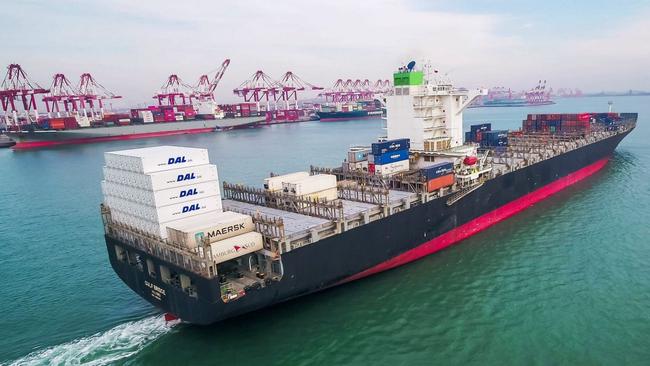China-US upbeat on trade
Recent talks give reason for hope but there’s a hard year ahead for international business.

All indications are that some progress has been made in this week’s trade talks in Beijing between US and Chinese officials.
The latest round of vice-ministerial-level trade talks between the two countries finished yesterday with China’s Ministry of Commerce saying that both countries had had “extensive, in-depth and detailed communication” on trade and structural issues and had agreed to maintain contact.
The ministry said the talks had “enhanced mutual understanding and laid a foundation for addressing each other’s concerns”.
After months of bitterness, instigated by the Trump administration in reaction to long-running US concerns about Chinese trade practices, the comments coming from the US and the Chinese sides were unusually upbeat.
But regardless of the outcome on the talks, which are working towards some resolution by March 1, China-US trade and political tensions are set to continue to cloud the markets in 2019.
The world will have to get used to living with a jerky, tetchy and stressful decoupling of the interrelationship between US and Chinese economies, a trend already being played out through companies such as Apple, Huawei and Virgin shareholder HNA.
Chinese companies have cut back their presence at the annual Consumer Electronics Show in Las Vegas this month, concerned about potential anti-Chinese measures from the Trump administration, and Chinese venture capital companies are backing off investments in Silicon Valley companies, in the face of potential objections from the Committee on Investment in the US with its newly beefed up review powers.
Huawei chief financial officer Meng Wanzhou is still in Canada facing charges and potential extradition to the US for alleged violation of sanctions on Iran. The case is a running sore on US-China relations that threatens to drag on through the year.
US companies with supply chain links in China are now looking to diversify their sourcing away from the manufacturing hubs of Guangdong province and the Yangtze River Valley area, regardless of any deal that may be struck before March 1.
China enthusiast Kerr Neilson is seeing returns on some of his Platinum Asset Management funds hit by the fall in the Chinese stockmarket.
UBS chairman Alex Weber may be right that the world markets have become too pessimistic about the economic outlook as each analyst rushes to outdo the other in predicting the next recession or stockmarket crash.
“The mood in the market is too pessimistic,” Weber said at the UBS Greater China Conference in Shanghai this week.
As he said, the mood at the beginning of last year was overoptimistic. Now, hyper pessimism has become the name of the game.
Holding one’s nerve in the uncertain world economic situation, particularly the slowdown in the Chinese economy, will be important for investors going into this year.
But for the rest of 2019 and into the 2020 US election year, battles, tensions and jostling for position between the world’s two largest economies will be part of the political and economic landscape. Overlaying that will be a steady slowdown in the Chinese economy, which has been the engine room for much world growth since the global financial crisis (not to mention the main factor in Australia’s 27 years of uninterrupted growth).
The Chinese economy is not going to collapse, but for many different reasons — trade tensions, rising wages and other costs such as social security payments now being levied on companies, an ageing population, a cutback on corporate and public debt levels — it is cooling markedly.
The World Bank this week downgraded its global economic growth outlook from 3 per cent last year to 2.9 per cent this year, predicting the Chinese economy will slow from 6.5 per cent growth last year to 6.2 per cent this year and next and 6 per cent in 2021.
For the Chinese, 6 per cent is a politically important figure to be publicly defended, although more sceptical observers predict its growth level could fall below 6 per cent in the next few years.
The Chinese consumer does not have the financial firepower to take over the heavy lifting of investment in holding up the economy, as evidenced by the fall in sales of passenger cars in China in 2018.
Total sales of cars were down by 5.8 per cent last year to 22.35 million, the first annual fall since 1990.
Sales last month were down by 19.3 per cent compared with the year before, marking the seventh straight month of car sale falls in the year.
The fall-off in sales of Apple phones in China is partly due to slowing consumer demand in the country but, going forward, it will also be driven by Chinese consumers growing more wary of high-priced US electronic products, in response to US attacks on Huawei, ZTE and other Chinese suppliers.
That said, given the war of words between Washington and Beijing over much of the past year, the fact that both sides have made positive comments about the talks this week is a big step forward.
US President Donald Trump has said he believed progress has been made, as has the Chinese side.
In a strict sense, China has more to lose from US tariffs and trade restrictions, but in a broader sense the US also loses by the stockmarket fall and investor uncertainty as Washington and Beijing test each other’s limits.
US-China trade and political tensions will continue to be with us for the foreseeable future, but this week’s talks also indicate that both sides see merit and mutual advantage in continuing to engage.



